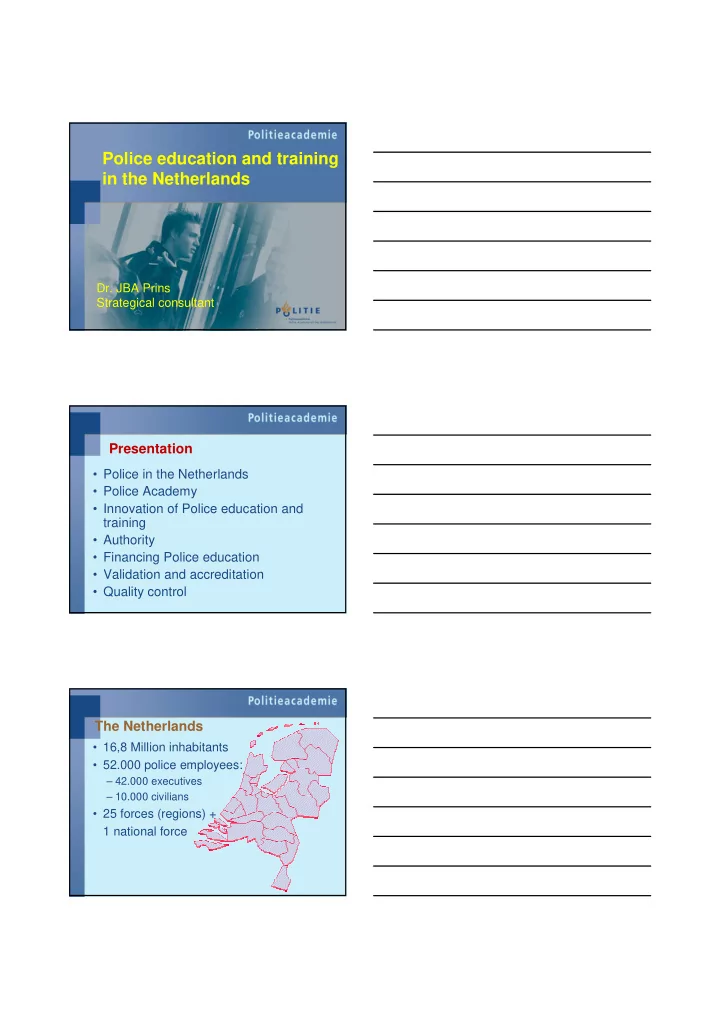

Police education and training in the Netherlands Dr. JBA Prins Strategical consultant Presentation • Police in the Netherlands • Police Academy • Innovation of Police education and training • Authority • Financing Police education • Validation and accreditation • Quality control The Netherlands • 16,8 Million inhabitants • 52.000 police employees: – 42.000 executives – 10.000 civilians • 25 forces (regions) + 1 national force
One Police Academy: . Drachten • Basic education (7 locations) . Amsterdam . . Apeldoorn . Den Haag . Rotterdam . Eindhoven Every year 2000-2500 recruits One Police Academy: • Basic education (7 locations) • Advanced or specialised Traffic . education (6 locations) Environment . . Crim. inv. . Conference Management ` centre Traffic . Public Order Every year about 15.000 students for specialised and management training programmes One Police Academy: . • Basic education (7 locations) • Advanced or specialised . education (5 locations) . . .. • In total 12 locations .. • Knowledge centre of Dutch police . • 1800 employees .
The Goal of innovation Competent police employees, who are able to cope all kind of problems they encounter in their work, now and in the future Why innovation? • Attitude change in Dutch society • Attitude change within police forces • Suitable police training to satisfy these changes • Police profession as an attractive job (with better career opportunities) Innovation starting points • Basing police training on professional profiles and core assignments of daily police practice (contextual) • Assigning a central role to the acquisition of competences (Competence based) • Equivalence with the Dutch standard professional education system
An Overview Initial Post-initial Level Management Specialist study 2 Assistant police officer 3 Police officer Key Assignments 4 All-round police Operational Criminal investigator - Detective officer manager Scene of crime officer Environmental police specialist Traffic police specialist Violence control specialist Immigration police specialist 5 Bachelor of policing Executive master Master of criminal investigation Environment policing specialist master of tactical policing Traffic policing specialist 6 Master of science in Executive master of policing police management Innovation starting points • Choosing the best places to learn (dual learning): � Learning on the job � Learning at the Academy � Learning at regular educational institutes • Making use of new information and communication technology (ICT) • Lifelong learning in a transparent and flexible coherent education system Dual education Police Academy Police forces Police training Regular education Basic training VET Learning on Advanced VHE the job training Universities Learning at regular educational institutes
Innovation starting points District Commissioner Route On-the-job Supervisor coach Force Student Academy Learning Trainer process supervisor Head of education Educational Development 1. Determining Job Profiles: � 5 initial levels and � 11 postinitial studies � 9-21 Key Assignments per initial level 2. Analyzing Key Assignment in competences and development of Competence Tests Authority Ministry of Internal Affairs Ministry of Justice Supervisory board Executive Boards 26 Police Forces Police Education Board Police Knowledge Board Inspectorate of public safety Social institutes Executive Board + Partners Police Academy Initial Postinitial Knowledge Recruitment Support, faculty faculty centre + selection facilities
Financing Police education Strength budget : Basic training: ± € 33 million � ± 2200 recruits Career budget : Advanced training: ± 40 million � ± 1200 career courses ± 5000 small courses Annotation: • Virtual budget per police force (size – dependent) • Keys: type of courses (costs, level, duration), N of students After inventory + analyses � division in POR • • Salary (wages) not included Validation and accreditation (1) Validation after requests for change: Needs for Checking and Actualisation: change: filtering by: Developing Start Political, Police Academy learning tasks up to date Society, Board of Forces and tests programm Policing, e Legal, etc, Police Education Educational Board and professional validation Validation and accreditation (2) Accreditation: (ex ante or ex post) - Only higher education: bachelor and master programmes - NVAO: Accreditation Organisation of the Netherlands and Flanders(member of ENQA) - Accreditated at Police Academy of the Netherlands: o Bachelor of policing o Master of science in policing o Master of Criminal investigation o Executive Master of Tactical policing o Executive master of Police management (2009)
Quality control (External) Police Education Counsel (POR: ex ante): • contributing to the development and maintenance of the qualification structure for police education; • contributing to an adequate match between police education and the needs of police forces, • formulating competence based exit qualifications, • ensuring diploma equivalence of police education in relation to regular vocational and higher education • advising on quality criteria for dual education, • advising on the financing of police education and training Inspectorate of Public Safety (ex post) • Results: Level of results and outcomes • Education: Quality of Education, training and examination • Policy and organisation: Facilitation of quailty of education by policy and organisation
Recommend
More recommend